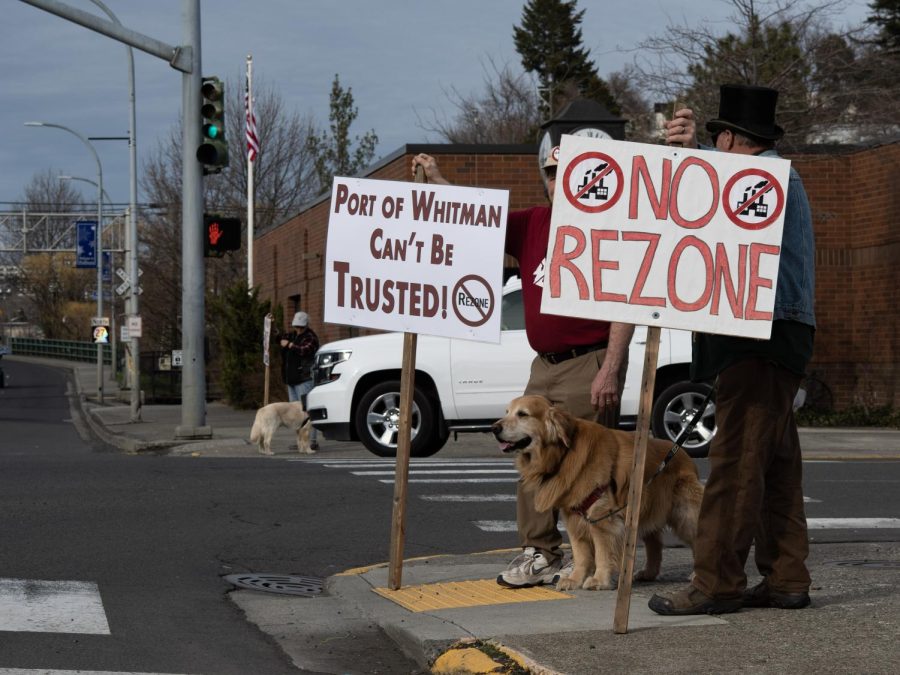Port of Whitman County withdraws industrial rezoning application
The port voted on April 20 at their commission meeting to cancel the project.
Protestors holds signs rejecting the biodiesel plant rezoning, Pullman, Wash. April 10th.
April 27, 2023
The controversial plan to rezone land on Old Wawawai Road for an Industrial Research park has ended.
Kara Riebold, Port of Whitman County executive director said the board voted to end their rezone application and withdraw the offer to purchase the land for the proposed Agricultural Advancement Campus.
Pullman residents protested the rezoning, with a petition reaching over 7,400 signatures.
While the board believes the campus would have brought opportunities to Pullman, aspects of the project changed, Riebold said. The reasons for the withdrawal included the AgTech OS biodiesel facility relocation, community concerns and lack of funding.
While the port originally received a $5 million loan to purchase the land from the Washington State Department of Commerce Community Economic Revitalization Board, wrote in a press release.
The ultimate reason the project ended was the lack of funding, Riebold said.
“The commission throughout the project heard a lot from the neighborhood and the community there and they were considering those concerns as well,” she said. “But, let’s say, the lack of funding kind of stops all consideration.”
Gwen Anderson, member of the rezoning protest group Save Pullman, said she was cautiously optimistic that the board would cancel the project but was still surprised at the vote.
“I still kind of thought they might push it through to just see what the City of Pullman was going to do with the rezone application. But I’m glad they stopped it,” she said. “They did the right thing. They don’t have the money without the CERB loan to do the campus and they would have used up all their resources.”
Anderson said the protest group helped to stop the rezoning in a “roundabout way” because their efforts influenced AgTech OS to change the location of their biodiesel project. If AgTech OS had not pulled out, the port would have continued on with the rezoning, she said.
Now that the port is more aware of Save Pullman, Anderson said she is interested to see if any of their modes of operations change, as it is difficult to follow the port’s communication with the public.
The port does not post their meeting recordings online, only the meeting minutes, she said.
Riebold said the Port has discussed posting the Zoom livestreams of the meeting but needs to research how to do so while following the Public Records Act.
The Public Records Act has requirements on storing and retaining meeting recordings for a certain period of time, she said. The port is looking into the specific requirements of the act and meeting those requirements.
Anderson said she lacks trust in the Port due to their lack of communication.
“When this all started, it really did seem to come out of nowhere,” she said. “They didn’t really ask for community input until they announced they were going to buy this land and put this refinery plant there. Then everybody was just shocked.”
Riebold said just because the public is surprised at something the Port does, does not mean the topic was not discussed at public meetings.
“Even when we took the vote at the last meeting, half the public in the room after that vote got up and left,” she said. “They didn’t stay to hear the rest of the port’s business and I think that’s a challenge that the commission sees is that we’re not very interesting at times.”
In between public meetings, Port staff is there to answer questions from the public on any topic that interests them, Riebold said.
The Port has no further plans with the land on Old Wawawai Road, she said.
Anderson said the protests were an educational lesson to be involved in the community and not be afraid to speak out, even with dealing with large organizations.
“Sometimes when the weather wasn’t so great, it was like, ‘Oh, God, I gotta go out and protest.’ But it was well worth it,” she said. “And you just put some extra layers on and wear some gloves and you went out and did it.”









